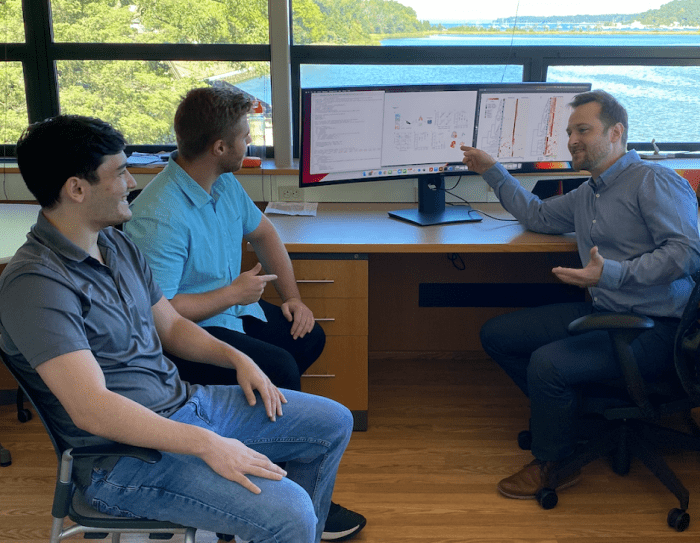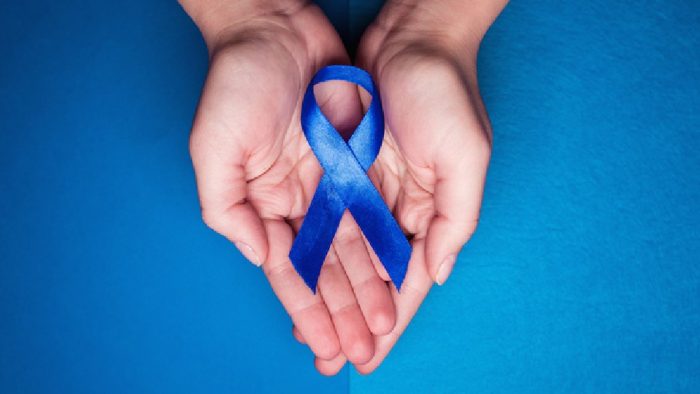By Daniel Dunaief
When Peter Westcott was growing up in Lewiston/Auburn, Maine, his father Johnathan Harris put the book “Human Genome” on his bed. That is where Westcott, who has a self-described “obsessive attention to detail,” first developed his interest in biology.
Westcott recently brought that attention to detail to Cold Spring Harbor Laboratory, where he is an assistant professor and Cancer Center member. He, his wife Kathleen Tai and their young children Myles and Raeya moved from Somerville, Massachusetts, where Westcott had been a postdoctoral fellow at the Koch Institute of Integrative Cancer Research at the Massachusetts Institute of Technology.
Westcott will take the passion and scientific hunger he developed and honed to the famed lab, where he plans to continue studies on colon cancer and the immune system.
“A lot of things attracted me to Cold Spring Harbor Laboratory,” said Westcott who had been to the lab during conferences, joining three Mechanisms and Models of Cancer meetings, and appreciated that the small size of the lab encourages collaboration and the sharing of ideas across disparate fields.
At this point, Westcott, who purchased a home in Dix Hills and started on campus on September 1st, has two technicians, Zakeria Aminzada and Colin McLaughlin working with him. He will be taking on a graduate rotation student from Stony Brook University soon and would also like to add a postdoctoral researcher within about six months. He plans to post ads for that position soon.
Research directions
Westcott said his research has two major research directions.
The first, which is more translatable, involves looking at how T cells, which he described as the “major soldiers” of the immune system, become dysfunctional in cancer. These T cells balance between attacking unwanted and unwelcome cells relentlessly, disabling and destroying them, and ignoring cells that the body considers part of its own healthy system. When the T cells are too active, people develop autoimmunity. When they aren’t active enough, people can get cancer.
“Most cancers, particularly the aggressive and metastatic ones, have disabled the immune response in one way or another, and it is our focus to understand how so we can intervene and reawaken or reinvigorate it,” he explained.
During cancer development, T cells may recognize that something on a tumor is not healthy or normal, but they sometimes don’t attack. Depending on the type of genetic program within the T cells that makes them tolerant and dysfunctional, Westcott thinks he can reverse that.
A big push in the field right now is to understand what the genetic programs are that underlie different flavors of dysfunction and what cell surface receptors researchers can use as markers to define T cells that would allow them to identify them in patients to guide treatment.
Westcott is taking approaches to ablate or remove genes called nrf4a 1, 2 and 3. He is attacking these genes individually and collectively to determine what role they play in reducing the effectiveness of the body’s immune response to cancer.
“If we knock [some of these genes] out in T cells, we get a better response and tumors grow more poorly,” he said.
Westcott is exploring whether he can remove these genes in an existing T cell response to cause a regression of tumor development. He may also couple this effort with other immunotherapies, such as vaccines and agonistic anti-CD40 antibody treatment.
As a second research direction, Westcott is also looking more broadly at how tumors evolve through critical transitions. Taking an evolutionary biology perspective, he hopes to understand how the tumors start out as more benign adenoma, then become malignant adenocarcinoma and then develop into metastatic cancer. He is focusing in particular on the patterns of mutations and potential neoantigens they give rise to across the genome, while concentrating on the immune response against these neoantigens.
Each tumor cell is competing with tumor cells with other mutations, as well as with normal cells. “When they acquire new mutations that convey a selective advantage” those cells dominate and drive the growth of a tumor that can spread to the rest of the body, Westcott said.
Using a mouse model, he can study tumors with various mutations and track their T cell response.
T cells tend to be more effective in combating tumors with a high degree of mutations. These more mutated tumors are also more responsive to immunotherapy. Westcott plans to study events that select for specific clones and that might shift the prevalence, or architecture, of a tumor.
Some of the work Westcott has done has shown that it is not enough to have numerous mutations. It is also important to know what fraction of the cancer cells contain these mutations. For neoantigens that occur in only a small fraction of the total cells in the tumor, the T cell responses aren’t as effective and checkpoint blockade therapy doesn’t work.
He wants to understand how the T cell responses against these neoantigens change when they go from being subclonal “to being present in most or all of the tumor cells,” he explained. That can occur when a single or few tumor cells acquire a selective advantage. His hypothesis is that these selective events in tumor progression is inherently immunogenic. \
By exploring the fundamental architecture of a tumor, Westcott hopes to learn the mechanisms the tumor uses to evade the immune system.
Ocean breeze
As Westcott settles in at CSHL, he is excited by the overlap between what he sees around the lab and the Maine environment in which he was raised.
“Looking out the window to the harbor feels like New England and Maine,” he said. “It’s really nostalgic for me. Being near the ocean breeze is where I feel my heart is.”
Before his father shared the “Human Genome” book with him, Westcott was interested in rocks and frogs. In high school, his AP biology teacher helped drive his interest in the subject by encouraging discussions and participation without requiring her students to repeat memorized facts. The discussions “brought to life” the subject, he said.
As for his work, Westcott chose to study colon cancer because of its prevalence in the population. He also believes colon cancer could be a model disease to study all cancers. By understanding what differentiates the 12 percent of cases that are responses to immunotherapy from the remainder that don’t respond as well to such approaches, he hopes to apply these lessons to all cancer.
“There is a huge, unmet need,” he said.







